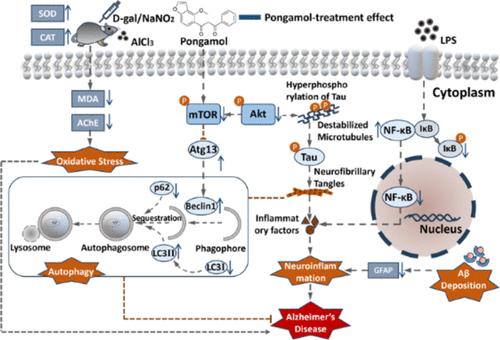当前位置:
X-MOL 学术
›
J. Agric. Food Chem.
›
论文详情
Our official English website, www.x-mol.net, welcomes your
feedback! (Note: you will need to create a separate account there.)
Pongamol Alleviates Neuroinflammation and Promotes Autophagy in Alzheimer’s Disease by Regulating the Akt/mTOR Signaling Pathway
Journal of Agricultural and Food Chemistry ( IF 5.7 ) Pub Date : 2024-06-06 , DOI: 10.1021/acs.jafc.4c00836 Kun Hu 1 , Shaojun Wu 1 , Jiaxin Xu 1 , Yongzhen Zhang 1 , Yanan Zhang 1 , Xinyuan Wu 1 , Jie Miao 1 , Yongxu Yao 1 , Susu Zhu 1 , Guangtong Chen 2 , Jie Ren 1
Journal of Agricultural and Food Chemistry ( IF 5.7 ) Pub Date : 2024-06-06 , DOI: 10.1021/acs.jafc.4c00836 Kun Hu 1 , Shaojun Wu 1 , Jiaxin Xu 1 , Yongzhen Zhang 1 , Yanan Zhang 1 , Xinyuan Wu 1 , Jie Miao 1 , Yongxu Yao 1 , Susu Zhu 1 , Guangtong Chen 2 , Jie Ren 1
Affiliation

|
Alzheimer’s disease (AD), one of the neurodegenerative disorders, is highly correlated with the abnormal hyperphosphorylation of Tau and aggregation of β-amyloid (Aβ). Oxidative stress, neuroinflammation, and abnormal autophagy are key drivers of AD and how they contribute to neuropathology remains largely unknown. The flavonoid compound pongamol is reported to possess a variety of pharmacological activities, such as antioxidant, antibacterial, and anti-inflammatory. This study investigated the neuroprotective effect and its mechanisms of pongamol in lipopolysaccharide (LPS)-induced BV2 cells, d-galactose/sodium nitrite/aluminum chloride (d-gal/NaNO2/AlCl3)-induced AD mice, and Caenorhabditis elegans models. Our research revealed that pongamol reduced the release of inflammatory factors IL-1β, TNF-α, COX-2, and iNOS in LPS-induced BV2 cells. Pongamol also protected neurons and significantly restored memory function, inhibited Tau phosphorylation, downregulated Aβ aggregation, and increased oxidoreductase activity in the hippocampus of AD mice. In addition, pongamol reversed the nuclear transfer of NF-κB and increased the levels of Beclin 1 and LC3 II/LC3 I. Most importantly, the anti-inflammatory and promoter autophagy effects of pongamol may be related to the regulation of the Akt/mTOR signaling pathway. In summary, these results showed that pongamol has a potential neuroprotective effect, which greatly enriched the research on the pharmacological activity of pongamol for improving AD.
中文翻译:

Pongamol 通过调节 Akt/mTOR 信号通路减轻阿尔茨海默病的神经炎症并促进自噬
阿尔茨海默病(AD)是神经退行性疾病之一,与Tau蛋白异常过度磷酸化和β-淀粉样蛋白(Aβ)聚集高度相关。氧化应激、神经炎症和异常自噬是 AD 的关键驱动因素,而它们如何影响神经病理学仍然很大程度上未知。据报道,黄酮类化合物 pongamol 具有多种药理活性,如抗氧化、抗菌和抗炎。本研究探讨了pongamol对脂多糖(LPS)诱导的BV2细胞、d-半乳糖/亚硝酸钠/氯化铝( d -gal/NaNO 2 /AlCl 3 )诱导的AD小鼠和秀丽隐杆线虫模型的神经保护作用及其机制。 。我们的研究表明,pongamol 可减少 LPS 诱导的 BV2 细胞中炎症因子 IL-1β、TNF-α、COX-2 和 iNOS 的释放。 Pongamol 还可以保护神经元并显着恢复记忆功能,抑制 Tau 磷酸化,下调 Aβ 聚集,并增加 AD 小鼠海马的氧化还原酶活性。此外,pongamol还逆转了NF-κB的核转移,并增加了Beclin 1和LC3 II/LC3 I的水平。最重要的是,pongamol的抗炎和启动子自噬作用可能与Akt/mTOR的调节有关。信号通路。综上所述,这些结果表明,庞加莫具有潜在的神经保护作用,极大地丰富了庞加莫改善AD的药理活性研究。
更新日期:2024-06-06
中文翻译:

Pongamol 通过调节 Akt/mTOR 信号通路减轻阿尔茨海默病的神经炎症并促进自噬
阿尔茨海默病(AD)是神经退行性疾病之一,与Tau蛋白异常过度磷酸化和β-淀粉样蛋白(Aβ)聚集高度相关。氧化应激、神经炎症和异常自噬是 AD 的关键驱动因素,而它们如何影响神经病理学仍然很大程度上未知。据报道,黄酮类化合物 pongamol 具有多种药理活性,如抗氧化、抗菌和抗炎。本研究探讨了pongamol对脂多糖(LPS)诱导的BV2细胞、d-半乳糖/亚硝酸钠/氯化铝( d -gal/NaNO 2 /AlCl 3 )诱导的AD小鼠和秀丽隐杆线虫模型的神经保护作用及其机制。 。我们的研究表明,pongamol 可减少 LPS 诱导的 BV2 细胞中炎症因子 IL-1β、TNF-α、COX-2 和 iNOS 的释放。 Pongamol 还可以保护神经元并显着恢复记忆功能,抑制 Tau 磷酸化,下调 Aβ 聚集,并增加 AD 小鼠海马的氧化还原酶活性。此外,pongamol还逆转了NF-κB的核转移,并增加了Beclin 1和LC3 II/LC3 I的水平。最重要的是,pongamol的抗炎和启动子自噬作用可能与Akt/mTOR的调节有关。信号通路。综上所述,这些结果表明,庞加莫具有潜在的神经保护作用,极大地丰富了庞加莫改善AD的药理活性研究。





















































 京公网安备 11010802027423号
京公网安备 11010802027423号